|
|
|
Sort Order |
|
|
|
Items / Page
|
|
|
|
|
|
|
| Srl | Item |
| 1 |
ID:
144200
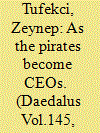

|
|
|
|
|
| Summary/Abstract |
The early Internet witnessed the flourishing of a digitally networked public sphere in which many people, including dissidents who had little to no access to mass media, found a voice as well as a place to connect with one another. As the Internet matures, its initial decentralized form has been increasingly replaced by a small number of ad-financed platforms, such as Facebook and Google, which structure the online experience of billions of people. These platforms often design, control, influence, and “optimize” the user experience according to their own internal values and priorities, sometimes using emergent methods such as algorithmic filtering and computational inference of private traits from computational social science. The shift to a small number of controlling platforms stems from a variety of dynamics, including network effects and the attractions of easier-to-use, closed platforms. This article considers these developments and their consequences for the vitality of the public sphere.
|
|
|
|
|
|
|
|
|
|
|
|
|
|
|
|
| 2 |
ID:
104086
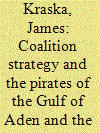

|
|
|
|
|
| Publication |
2009.
|
| Summary/Abstract |
The April 2009 seizure of the U.S.-flagged Motor Vessel Maersk Alabama and its twenty American crew members off the coast of Somalia should signal a change in counterpiracy strategy, away from a focus on major warship deployments by distant state major maritime powers, and toward development of a regional maritime security force constructed around numerous smaller patrol craft. Outside powers should focus on further advancing new international law and policy frameworks, which have become the most significant force multipliers for developing maritime security and offer the most effective approach to counterpiracy in the Horn of Africa. Complementing this effort will require a long-term program of regional maritime-security capacity building to support implementation of the new law and policy approaches. Piracy flourishes at the seams of globalization because jurisdiction is unclear and pirates exploit the inherent isolation of individual vessels and nations. Regional powers in the Horn of Africa have underdeveloped law enforcement and judicial systems and suffer from a severe lack of resources. In this setting, global and regional legal and policy frameworks in the areas of operational maritime security, judicial institutions, and law enforcement will be more effective in addressing piracy than adding another warship from an outside naval power to the equation.
|
|
|
|
|
|
|
|
|
|
|
|
|
|
|
|
| 3 |
ID:
087920
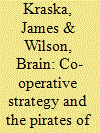

|
|
|
|
|
| Publication |
2009.
|
| Summary/Abstract |
Maritime piracy flourishes at the seams of globalisation because jurisdiction is unclear and pirates exploit the inherent isolation of individual vessels and nations. Given these dynamics, new international law and policy frameworks have become the most effective force multiplier for implementing a new collaborative approach, and the first test is the challenge posed by maritime piracy in the Horn of Africa.
|
|
|
|
|
|
|
|
|
|
|
|
|
|
|
|
| 4 |
ID:
062702


|
|
|
|
|
| Publication |
London, Oxford University Press, 1924.
|
| Description |
xxxii, 206p.Hbk
|
|
|
|
|
|
|
|
|
|
|
|
Copies: C:1/I:0,R:0,Q:0
Circulation
| Accession# | Call# | Current Location | Status | Policy | Location |
| 015875 | 954.0292/DOW 015875 | Main | On Shelf | General | |
|
|
|
|
| 5 |
ID:
112166


|
|
|
| 6 |
ID:
114375
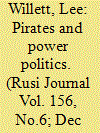

|
|
|
| 7 |
ID:
147066
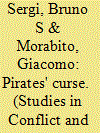

|
|
|
|
|
| Summary/Abstract |
During the last decades, the activities of pirates have increased exponentially in Eastern Africa, with their attacks becoming considerably more violent. In addition to the intrastate and interstate conflicts, the lack of state capacity and the presence of terrorist groups, maritime piracy represents a serious and sustained threat to economic security. Indeed, from an economic point of view, pirates affect international trade through an increasing insecurity related to the prompt delivery of the goods transported. The aim of this work is to explore the main works on maritime piracy analyzed in quantitative economics.
|
|
|
|
|
|
|
|
|
|
|
|
|
|
|
|
| 8 |
ID:
148976
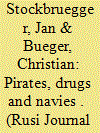

|
|
|
|
|
| Summary/Abstract |
International operations against piracy in the Western Indian Ocean are due to wind down. Some major external navies will probably remain, but the region’s states will have to adjust to their new role in managing the challenging security environment. In this article, Christian Bueger and Jan Stockbruegger examine the options for cooperation in this volatile region.
|
|
|
|
|
|
|
|
|
|
|
|
|
|
|
|
| 9 |
ID:
106771
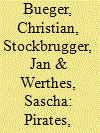

|
|
|
|
|
| Publication |
2011.
|
| Summary/Abstract |
The dominant approach to counter-piracy strategy off Somalia is astonishingly narrow-minded. Deterrence, surveillance and military operations do not provide sustainable or efficient solutions; better strategic alternatives must draw on the lessons of 21st-century peace operations. This perspective leads to an understanding of counterpiracy as a problem of peacebuilding. This allows restructuring and reframing of the problem to permit a much wider repertoire of policy solutions than is currently conceived. This repertoire may include development and security assistance programmes as well as state-building programmes. The approach also permits integration of lessons learned in the frame of international peacebuilding operations, including avoiding technocratic solutions, focusing on power constellations, integrating local knowledge and incrementalism. If the international community wishes to take piracy seriously and respond to its complexities, it would be well advised to adopt a policy in which such alternatives are considered.
|
|
|
|
|
|
|
|
|
|
|
|
|
|
|
|
| 10 |
ID:
080636
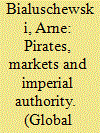

|
|
|
|
|
| Publication |
2008.
|
| Summary/Abstract |
This article argues that during the years 1716-1726 diverse groups of maritime predators operated opportunistically across the spectrum from state-sanctioned privateering to outright piracy. All of these freebooters relied on access to markets if they were to survive in an increasingly hostile political environment. Merchants as well as colonists in various parts of the Atlantic World profited from their connections to marauders. It was only possible to successfully suppress piracy in the 1720s when the colonial authorities managed to close their ports to pirates
|
|
|
|
|
|
|
|
|
|
|
|
|
|
|
|
| 11 |
ID:
088900
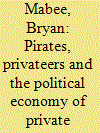

|
|
|
|
|
| Publication |
2009.
|
| Summary/Abstract |
Historical accounts of private violence in international relations are often rather under-theorised and under-contextualised. Overall, private violence historically needs to be seen in the context of the relationship between state-building, political economy and violence, rather than through the narrative of states gradually monopolising violence. Pirates and privateers in late-seventeenth and early-eighteenth century Europe were embedded in a broader political economy of violence which needed and actively promoted 'private' violence in a broader pursuit of power. As such, the de-legitimatisation of piracy and privateering were the consequence of a number of interlinked political economic trends, such as the development of public protection of merchant shipping (through the growth of centralised navies), the move away from trade monopolies to inter-imperial trade, and the development of capitalism and industrialism. Present forms of private violence also need to be seen as part of a broader historical dynamic of war, violence and political economy.
|
|
|
|
|
|
|
|
|
|
|
|
|
|
|
|
| 12 |
ID:
126054
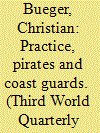

|
|
|
|
|
| Publication |
2013.
|
| Summary/Abstract |
In this article I develop a practice-theoretical account to provide the first systematic investigation of the justification of Somali piracy. Arguing for an understanding of piracy as a 'community of practice', I show how this community is organised by a 'grand narrative' that projects piracy as a quasi-state practice of the protection of sovereignty against foreign intruders. Paying attention to narrative provides an explanation for the persistence of piracy and assists us in understanding the phenomenon. Relying on publicly available interviews with pirates, I deconstruct this grand narrative and detail the different functions of the narrative in the light of situations in which it is told. The article develops an alternative perspective on piracy based on the study of practice, narrative and situation that provides new avenues for the study of clandestine, illicit or violent practices.
|
|
|
|
|
|
|
|
|
|
|
|
|
|
|
|
| 13 |
ID:
121643


|
|
|
| 14 |
ID:
075562
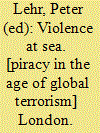

|
|
|
|
|
| Publication |
London, Routledge, 2007.
|
| Description |
xii, 274p.
|
| Standard Number |
0415953200
|
|
|
|
|
|
|
|
|
|
|
|
Copies: C:1/I:0,R:0,Q:0
Circulation
| Accession# | Call# | Current Location | Status | Policy | Location |
| 052064 | 364.164/LEH 052064 | Main | On Shelf | General | |
|
|
|
|
|
|
|
|
|